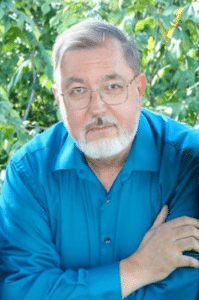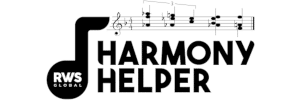Meet Daniel Gawthrop, a composer, broadcaster, clinician, adjudicator, organist, conductor, teacher, and writer who has over 100 commissioned pieces. His a cappella motet “Sing Me to Heaven” is among the most frequently performed choral pieces of modern times and has sold more than a half-million copies.

You have been the recipient of more than 100 commissions. What do you think draws other artists and arts leaders to your work?
Much of my work has been for choral ensembles and conductors of those groups tell me that they find a good balance between technical challenges and accessibility in my pieces. Others say that my ability to maximize the content and impact of a text is the primary draw. I work hard to create music which works simultaneously on multiple levels, offering something both to an audience which may only hear it once, as well as continuing insights to the performers who will spend much more time with it.
Can you tell us a little about your process of composing?
When working with a text I always strive to find the music that’s in the words. That gives me the best chance of achieving musical results which reflect the text specifically and intimately. With instrumental music, I usually begin at the keyboard simply playing with ideas. In either case, I am a pencil-and-paper guy—the computer is an engraving tool for me, not a composing platform.
Of the hundreds of pieces you have created, is there one that you are most proud of?
Sing Me to Heaven has attracted more performances than anything else I have ever written, and though it’s not the most technically polished piece in my catalog, it does seem to have touched more hearts than anything else I have done. I value that ability to lift spirits and leave people changed through the gift of music.
You are a man of many talents. You have been a composer, broadcaster, clinician, adjudicator, organist, conductor, teacher, writer, and music critic. If you could only choose one of these to do for the remainder of your career, which one would it be and why?
I would continue composing. I feel that I can be of more use to the world by writing things which can be used to lift spirits and change hearts than in any other role I have filled.
As an organist, you have likely been able to play some of the greatest instruments in the world. Do you have a favorite organ?
It’s hard to imagine a more musically successful instrument than the Æolian-Skinner designed by G. Donald Harrison for the Tabernacle in Salt Lake City. It’s sited in a magnificent acoustical space and offers an endless variety of tonal color. From a cleanly discernible pianissimo to a thundering fortissimo it satisfies the composer, the organist, and the listener in me.
How has COVID-19 impacted your work?
I went to a regional convention of the American Choral Directors Association in early March in Salt Lake City, right before the quarantine began. That was the last public gathering I attended. When I complete the remaining three commissions which were already on my calendar, I will have shifted entirely to self-directed projects as new commissions have stopped appearing. But on a day-to-day basis, things don’t look all that different—I have been working from home full-time for twenty years.
Have you been able to collaborate with other composers/artists during the lockdown?
I wrote an arrangement of Be Thou My Vision for euphonium quartet for my friend Mark Jenkins, who is the lead euphonium player in the Marine Corps Band “The President’s Own” in Washington, D.C. He recorded it with his colleagues in the band and it has been published in the Dunstan House catalog at Subito Music.
https://www.facebook.com/watch/?v=253700255837725
I was able to participate in a live recording of a vocal duet, He That Keepeth Thee which I wrote under a grant from the Art for Uncertain Times project. The two singers and I were permitted to use the recital hall on the closed campus of the College of Southern Idaho for this session. With my wife as videographer and page-turner, the four of us maintained proper social distancing long enough to create a demo of the new piece:
https://www.centerforlatterdaysaintarts.org/gawthrop-art-for-uncertain-times
What technology (such as Zoom or singing apps) have you used to continue to do your work in a virtual world?
My pencils and manuscript paper continue to serve me well, thank goodness. Other than that, I did finally download Zoom for a couple of Q&A sessions with choirs that were no longer meeting in person. That worked pretty well.
What would you say to other artists/musicians that are craving ensemble work and to continue performing for their mental health during this pandemic?
While there’s no substitute for being physically present among collaborators in live rehearsal and performance, times of restriction offer some blessings of their own. Personally, I have been incredibly productive as a composer during this period. I have also had time for far more piano and organ practice than usual which has allowed me to get some things under my fingers which I would likely have never learned without these unique circumstances. I’ve done lots of reading, both professional and recreational. Finally, the internet has allowed my wife and me to keep more closely in touch with scattered family members, which is a real blessing. Life has been quite different these past few months, but not meaningfully worse. I find that maintaining an attitude of gratitude is very helpful for my mental health and I recommend it to all.
Daniel E. Gawthrop was born in 1949 in Fort Wayne, Indiana. He has been the recipient of over one hundred commissions to write original music. His published choral and organ works are in the catalogs of Dunstan House, Alfred Publishing, Alliance Music, Lorenz Publishing Co., and others. His a cappella motet “Sing Me to Heaven” is among the most frequently performed choral pieces of modern times and has sold more than a half-million copies.
Gawthrop’s music has premiered in the Concert Hall of the John F. Kennedy Center for the Performing Arts, the Salt Lake City Mormon Tabernacle, and Washington National Cathedral among dozens of other prestigious venues. His choral pieces have been performed and recorded by such eminent ensembles as The United States Air Force Singing Sergeants, the Gregg Smith Singers, the Turtle Creek Chorale, the Paul Hill Chorale, the American Boychoir, the Mormon Tabernacle Choir, the Cathedral Choral Society (of Washington National Cathedral) and literally hundreds of other groups in the U.S. and abroad.
In addition to his work as a composer, Gawthrop has been active as a broadcaster, clinician, adjudicator, organist, conductor, teacher, and writer, including a period as music critic for The Washington Post. Gawthrop is a Life Member of the American Choral Directors Association, a member of the American Guild of Organists, and a member of Phi Mu Alpha Sinfonia, the music fraternity.
